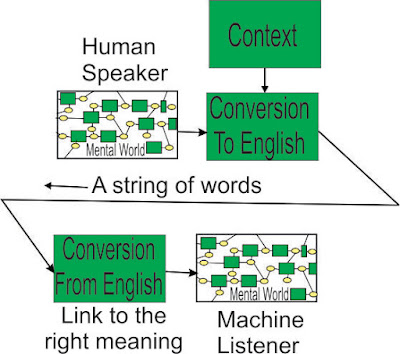A Single Mind Problem
First, something that is not a single mind problem – a new aircraft.
You assemble specialists – specialists in airframes, engines,
wings, control surfaces, avionics, undercarriages. They all beaver away largely
independently.
The person doing the brakes on the undercarriage needs next
to zero knowledge of the avionics. Yes, they get a signal of how hard the brakes should be applied, but that is it.
Now, a single mind problem.
Let’s say you assemble specialists – specialists in each of nouns, verbs, prepositions, adjectives, adverbs, pronouns, idiom. They can’t beaver away independently, because the language tightly interweaves all those things together, and they would end up fighting over individual words – is “following” a noun, a participle, an adjective, a preposition, a gerund. It depends on the words around it. With our current vocabulary (fifty thousand words in the dictionary), there are:
Nouns with definitions: 12,500 (number of definitions for each word ranging from 1 to 80)
Noun/verbs with definitions: 3,000
Noun/verb/adjectives with definitions: 300
Wordgroups (groups of words with specific meaning - ambient temperature): about 15,000
Defined terms - a large document - say 50
A team approach doesn’t work, no matter how much money you pour into it. The result is that people shy away from even trying to do it – “we tried that and it didn’t work” – it was never going to work the way you tried to do it (should mention the lack of discipline of some attempts, meaning they couldn't actually see what the problem was).
But millions of people learn a language each year - what is the problem - why can't a machine - a clever machine - do it? Because a person has an Unconscious Mind, having an excellent memory, which gets knocked into shape by being buffeted by hundreds of thousands of language incidents, changing its structure. Emulating the ability of the Unconscious Mind, which can use text to locate and modify its internal structure, with the Conscious Mind oblivious, is the real target.
The problem requires a single mind which is willing to devote many years in seeing how to represent the abstract objects of language and the connections among them. The Four Pieces Limit bites hard here, as many situations require considerably more than four pieces in play. All one can do consciously is do facets of the problem and hope polishing them individually will eventually allow them to coalesce and get past the limit.
But that is the job of linguists! Linguists have a much narrower
focus, and the same Four Pieces Limit. If you look at their papers, you will see a framework knocked up on the spot to suit a particular example they are discussing - can't do that. It just isn't a team sport.
What about the other option - a professor and grad student? It is not a short term exercise - more like twenty years - it couldn't stand the transfer every three or five years, from one grad student to another.
What about we do a simple version, and refine it over time? While any part is simple, it will continually fall over, to the point of being unusable.



Comments
Post a Comment